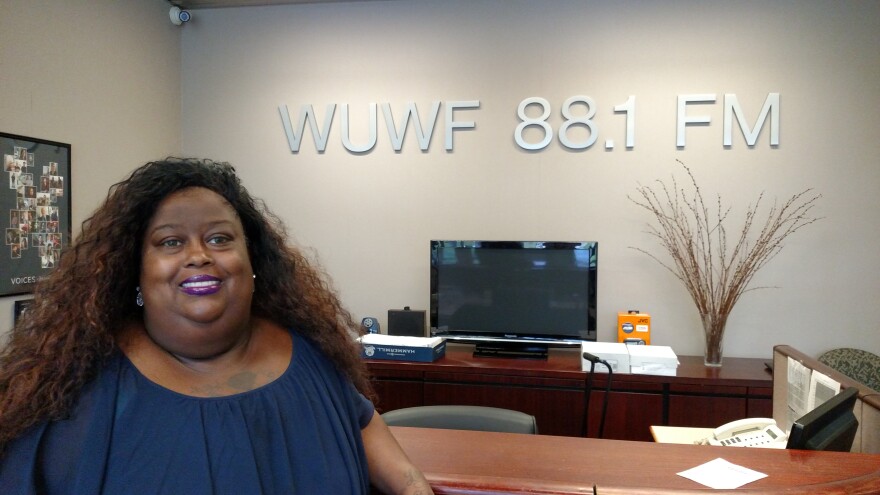There are five candidates vying for the open seat in the Florida House of Representatives District 1, encompassing the vast majority of Escambia County. Political newcomer Franscine Mathis is one of two Democrats in the race.
Like some of her opponents, Mathis is from the Pensacola area. She has three grown children.
“I’m a proud Army mom,” Mathis said, referring to the fact that both of her sons are now serving in the Army. Her daughter is attending college.
Mathis began her professional career as a teacher. But, after a few years she went back to school to become a nurse, which is how she earns a living.
Her life turned in another direction when she saw, up close, some of the harsh realities faced by family members in the criminal justice system.
“I went to court with them, seeing some things that was [sic] going on in our judicial system that I wasn’t too thrilled about,” said Mathis. “So, the only way I figured I could help out or try to find some information is to go back to school.”
This time, Mathis got a paralegal degree. She also launched the non-profit organization Ladies With a Heart “Stands for Justice,” after she began hearing about cases of local youth prosecuted as adults.
The transfer of juveniles to the adult court system is known as direct file, and in Florida, it is the sole discretion of the state attorney.
This issue of direct file, which is a big problem in the state and disproportionately affects African Americans, is one of the main reasons she decided to run for office. If elected, it’s one of the first things she wants to change.
“Well, there should be a procedure that they should go by and it needs to be a panel of people that look at their (juveniles’) mental stability; are they taking any meds,” suggested Mathis. She proposes the review of those and other mitigating factors, such as family and educational background, on the front end of the process.
Additionally, she says it’s unrealistic to expect a 15 or 16-year-old to understand or have equal access to the criminal justice system.
“Because a lot of these people come from poverty homes, so they’re not gonna [sic] to have the money to go spend $20,000 and $30,000 to go get one of the ‘bigger-time’ lawyers that will be able to handle the situation,” she said, referencing the more likely scenario of being assigned an already overworked public defender. “So, they’re not gonna [sic] have time to really sit down with this minor, because once you’re adjudicated, there is no longer sitting down with the parents. Everything is solely on that minor.”
For the youth who wind up in the adult court system, Mathis recommends separate correctional facilities. Incarceration with grown men, she argues, leaves juveniles vulnerable to sexual assault, abuse of drugs to cope, and even suicide.
Another priority issue for Mathis is addressing the environmental and health concerns of the people in Pensacola’s historically black community of Wedgewood. For decades the neighborhood, where she grew up and still resides, has been surrounded by numerous landfills and borrow pits.
She ponders what happens to all the chemicals and trash in the pits when it rains and the ground gets soggy, “This stuff is seeping down and then it’s going into your water lines. So, when you’re drinking this water, you’re drinking the chemicals. You are taking in some pretty bad toxin. So, we need to eliminate that; we need to get this cleaned up.”
In the north end of Florida House District One, Mathis has ideas for helping the small town of Century. She says the poverty-ridden community could benefit from economic development aimed at those individuals who travel there to visit loved ones at the Century Correctional Institution.
“We (visitors) don’t have any hotels. We don’t have any restaurants. We bring our kids, we don’t have anywhere to take them to have fun,” Mathis said of the necessity to drive an additional 45 minutes to Pensacola to find amenities after many have already driven six to seven hours to visit.
“So, what I’m proposing is if we get some hotels, if we start getting some developers to come out, give them a tax deduction.”
For Mathis, economic development, access to jobs, transportation, health care, and equal justice all are interconnected.
Getting a chance to address these issues as a state legislator may be a long shot. But, even though her campaign has reported no monetary contributions (as of July 27) and she was late getting into the race (May 2018), Mathis is not deterred because of her grassroots efforts over the past five years.
“I have been out here living and talking to the people of district one trying to come up with solutions for their issues and concerns,” she said. “I have had the job fairs to help people to find jobs in this community. I have had the recruiting and the college fairs.”
In the race for Florida House District 1, Mathis faces Vikki Garrett in Democratic Primary on August 28. The winner faces the Republican nominee in November.





